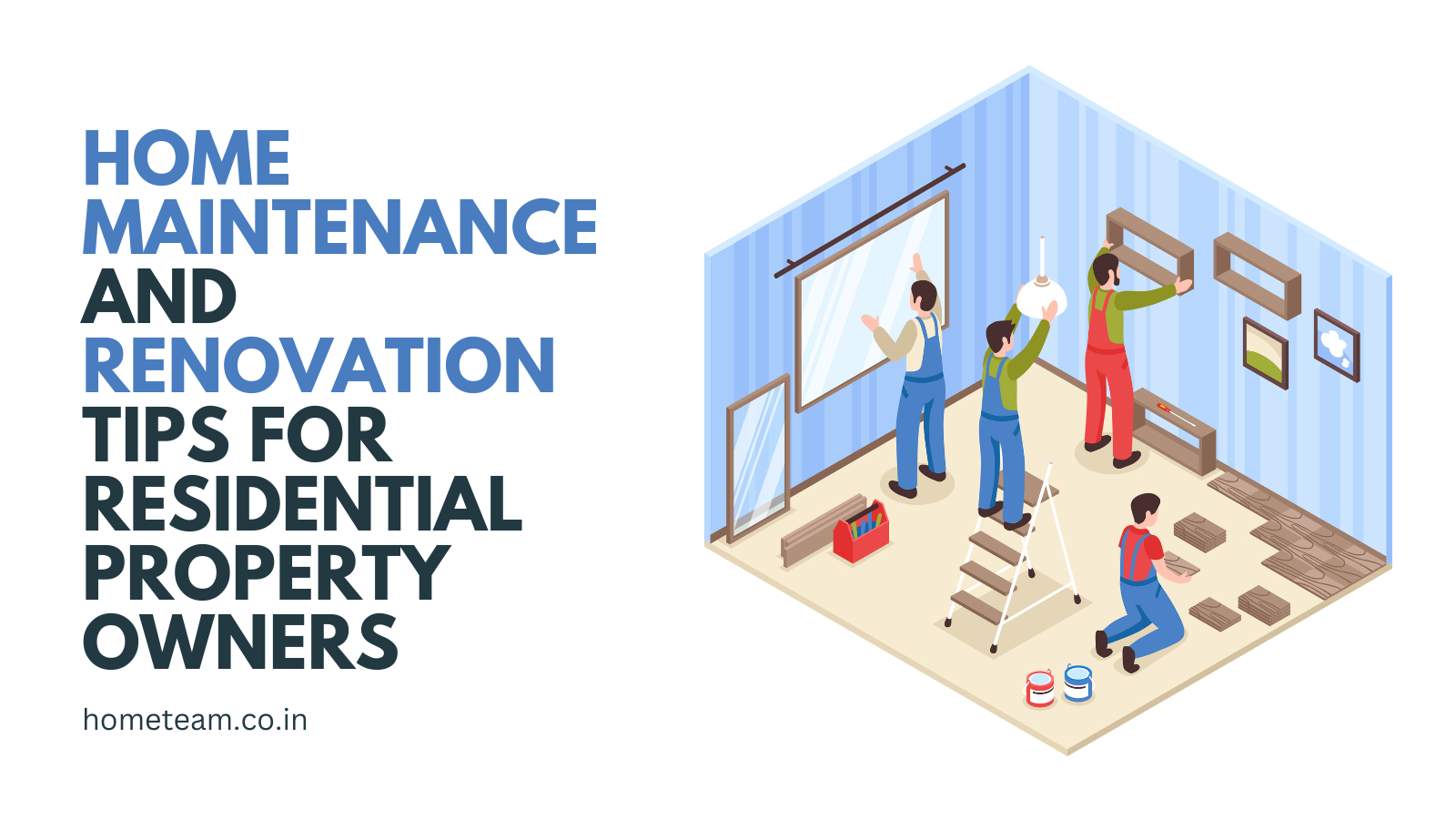Home Maintenance and Renovation Tips for Residential Property Owners
Home maintenance and renovation are essential for maintaining the value and safety of your residential property. By regularly inspecting and repairing your home, you can prevent small problems from becoming big ones. And by making well-chosen renovations, you can improve the comfort, functionality, and curb appeal of your home.
This blog post will provide a detailed guide on home maintenance and renovation tips for residential property owners. We will cover topics such as:
- Regular maintenance tasks
- Common repairs
- Renovation projects
- Energy efficiency upgrades
- Tips for hiring contractors
Regular maintenance tasks
There are a number of regular maintenance tasks that you should perform on your home to keep it in good condition. These tasks include:
Checking and cleaning your gutters: Clogged gutters can lead to water damage to your roof and foundation. Be sure to clean your gutters at least twice a year, and more often if you live in an area with heavy rainfall.
Inspecting your roof: Your roof is one of the most important parts of your home, so it's important to have it inspected by a qualified professional at least once a year. This will help to identify any potential problems, such as missing shingles or damaged flashing.
Cleaning your HVAC system: Your HVAC system is responsible for heating and cooling your home, so it's important to keep it clean and well-maintained. Change the air filters in your HVAC system every month, and have the system professionally serviced once a year.
Testing your smoke detectors and carbon monoxide detectors: Smoke detectors and carbon monoxide detectors can save your life in the event of a fire or gas leak. Be sure to test your smoke detectors and carbon monoxide detectors every month, and change the batteries once a year.
Common repairs
Some of the most common repairs that homeowners need to make include:
Fixing leaky faucets: Leaky faucets can waste water and money. To fix a leaky faucet, you may need to replace the washers or gaskets.
Replacing broken tiles: Broken tiles can make your bathroom or kitchen look unsightly. To replace a broken tile, you will need to remove the old tile and then install a new tile in its place.
Unclogging drains: Clogged drains can be a nuisance and can also lead to water damage. To unclog a drain, you can try using a plunger or a drain snake. If you cannot unclog the drain yourself, you may need to call a plumber.
Renovation projects
If you are looking to improve the comfort, functionality, or curb appeal of your home, you may want to consider doing some renovations. Some popular renovation projects include:
Kitchen renovation: A kitchen renovation can completely transform your cooking and dining space. You can update your cabinets, countertops, appliances, and flooring to create a kitchen that is both stylish and functional.
Bathroom renovation: A bathroom renovation can turn your bathroom into a spa-like oasis. You can update your fixtures, tiles, and flooring, and you can even add a new bathtub or shower.
Basement renovation: A basement renovation can add extra living space to your home. You can finish your basement into a family room, home office, or even an extra bedroom.
Adding a deck or patio: Adding a deck or patio to your home can create a great space for entertaining or simply relaxing outdoors.
Energy efficiency upgrades
One of the best ways to save money on your energy bills is to make energy efficiency upgrades to your home. Some popular energy efficiency upgrades include:
Insulating your attic: Adding insulation to your attic can help to keep your home cool in the summer and warm in the winter.
Upgrading your windows: Older windows can be drafty and inefficient. Upgrading to new energy-efficient windows can help to reduce your energy bills.
Installing a programmable thermostat: A programmable thermostat can help you to save energy by automatically adjusting the temperature of your home when you are away or sleeping.
Sealing air leaks: Small air leaks around your windows, doors, and other openings can let out conditioned air and waste energy. Sealing these air leaks can help to improve the energy efficiency of your home.
Tips for hiring contractors
If you are planning to do any major renovations to your home, you will likely need to hire contractors. When hiring contractors, it is important to:
- Get multiple estimates from different contractors.
- Check the references of the contractors you are considering.
- Make sure that the contractors are licensed and insured.
- Get a written contract in place before any work begins.
If you are a homeowner, it is important to be proactive about home maintenance and renovation. By following the tips in this blog post, you can keep your home in good condition and protect your investment.
FAQs
Regular home maintenance is essential for preserving your property's value and functionality. Key areas to focus on include the roof, plumbing, electrical systems, HVAC, and the exterior of your home. Inspect and maintain these components regularly to prevent costly repairs.
Preparing for a renovation involves setting a clear budget, defining your goals, and hiring the right professionals. Consult with contractors, obtain permits if necessary, and create a detailed plan to minimize disruptions during the renovation process.
Improving energy efficiency can lower utility bills and benefit the environment. Consider upgrading insulation, installing energy-efficient windows and doors, and investing in high-efficiency appliances during your renovation to save on long-term costs.
When selecting a contractor, do your research by checking references, verifying licenses and insurance, and reviewing their portfolio. Ensure they understand your vision and can provide a detailed estimate. Clear communication and trust are crucial.
Avoid common renovation mistakes like underestimating the budget, neglecting proper planning, and failing to obtain necessary permits. Also, be cautious about making impulsive design decisions that may not suit your long-term needs or style.










